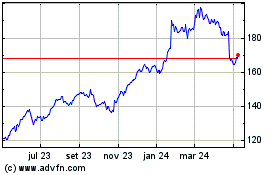Potential IBM Watson Health Sale Puts Focus on Data Challenges
24 Fevereiro 2021 - 9:59AM
Dow Jones News
By John McCormick
International Business Machines Corp.'s decision to explore a
sale of its Watson Health business highlights the challenges of
building data sets that unlock the full value of artificial
intelligence in solving healthcare problems.
From the start, IBM said massive data sets were core to its
mission to help doctors tackle big problems like diagnosing and
curing cancer. A company spokeswoman Tuesday said that IBM Watson
Health is committed to leading the market in healthcare data sets,
and that Watson Health offers databases that include "real-world,
longitudinal clinical, operation and financial data and analytic
tools."
Even so, some experts found that it can be difficult to apply AI
to treating complex medical conditions. Having access to data that
represents patient populations broadly has been a challenge,
experts told the Journal, and gaps in knowledge about complex
diseases may not be fully captured in clinical databases.
"I believe that we're many years away from AI products that
really positively impact clinical care for many patients," said Dr.
Bob Kocher, a partner at venture-capital firm Venrock who focuses
on healthcare IT and services investments and who was a White House
health adviser under President Barack Obama.
Software that makes recommendations on personal medical
treatments needs data on what actions have worked in the past. But
data on medical histories and treatment outcomes aren't always
complete, may be recorded in different formats, and may be sitting
in various systems owned by insurance carriers, health providers
and other organizations.
It is hard to build an AI technology that tells somebody what
cancer treatment they should get, "because if you're wrong, they're
going to die," Dr. Kocher said. "So it needs to be perfect." Since
the data used to train the AI model is imperfect, the tool will
fall short of expectations, he said.
Some problems just aren't computable, according to Dr. Andrew
Rosenberg, chief information officer of Michigan Medicine, a health
system affiliated with the University of Michigan.
Dr. Rosenberg said he met with Watson eight years ago. "One of
the issues that came out of those discussions was computation," he
said. "How do you compute the 25-year-old saying they don't want
the Covid vaccine? How do you compute that and predict that?"
"If you look at where there's been a lot of success in medical,
it's been around using AI to analyze an MRI, or an X-ray," said
Stephen Messer, co-founder and vice chairman of Collective[i], an
AI company focused on optimizing the sales process in a range of
markets.
Once the AI is trained, he said, "it's very good at whatever it
needs to find. It's repetitive. These are the places where you're
having huge wins."
Despite the broader challenges, the application of artificial
intelligence to healthcare could find more success in certain
areas, some experts say.
"What's getting people excited is neural network technology,"
Mr. Messer said.
Neural networks are composed of layers of interconnected
artificial "neurons" that automatically learn about the features of
a specific object based on large amounts of data.
Almost all the successful AI players are using networks of data
to leverage neural nets, Mr. Messer said.
Wearable devices are collecting huge amounts of data, Mr. Messer
said. Devices are going to start to identify early on that someone
is at risk of getting atrial fibrillation, he said. A new owner of
Watson Health should look at different ways it could leverage an
increased healthcare data pool, and then apply new technologies
such as neural nets, he added.
Health and fitness applications can collect vast amounts of data
from people with smartphone and smartwatches and represent one
avenue to apply neural networks. Researchers are looking to see if
AI can analyze heartbeats, sleep patterns and speech to identify
everything from heart problems to early-stage dementia.
As more companies figure out how to pool sets of health data to
create even more scale, the application of deep learning to
healthcare may continue to develop, according to Mr. Messer.
David Uberti contributed to this article.
Write to John McCormick at john.mccormick@wsj.com
(END) Dow Jones Newswires
February 24, 2021 07:44 ET (12:44 GMT)
Copyright (c) 2021 Dow Jones & Company, Inc.
International Business M... (NYSE:IBM)
Gráfico Histórico do Ativo
De Mar 2024 até Abr 2024

International Business M... (NYSE:IBM)
Gráfico Histórico do Ativo
De Abr 2023 até Abr 2024
